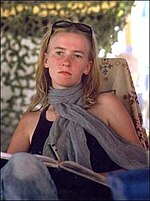Rachel Corrie
 Rachel Aliene Corrie (April 10, 1979 – March 16, 2003) was an American nonviolence activist and diarist. She was a member of the pro-Palestinian International Solidarity Movement (ISM) and was active throughout the Israeli-occupied Palestinian territories. In 2003, Corrie was in Rafah, a city in the Gaza Strip, where the Israeli military was demolishing Palestinian houses at the height of the Second Intifada. While protesting the demolitions as they were being carried out, she was killed by an Israeli armored bulldozer that crushed her.
Rachel Aliene Corrie (April 10, 1979 – March 16, 2003) was an American nonviolence activist and diarist. She was a member of the pro-Palestinian International Solidarity Movement (ISM) and was active throughout the Israeli-occupied Palestinian territories. In 2003, Corrie was in Rafah, a city in the Gaza Strip, where the Israeli military was demolishing Palestinian houses at the height of the Second Intifada. While protesting the demolitions as they were being carried out, she was killed by an Israeli armored bulldozer that crushed her.Corrie was born in Olympia, Washington, the United States in 1979. After graduating from Capital High School, Corrie went on to attend Evergreen State College. She took a year off from her studies to work as a volunteer in the Washington State Conservation Corps, where she spent three years making weekly visits to mental patients. While at Evergreen State College she became a "committed peace activist" arranging peace events through a local group called "Olympians for Peace and Solidarity". She later joined the International Solidarity Movement (ISM) organisation in order to protest the policies of the Israeli army in the West Bank and Gaza Strip. She had gone to Gaza as part of her college's senior-year independent-study proposal to connect Olympia and Rafah with each other as sister cities. While in Rafah on March 16, 2003, she joined other ISM activists in efforts to nonviolently prevent Israel's demolition of Palestinian property, where she was killed by an Israeli bulldozer that crushed her.
Physicians present and fellow ISM activists claimed that Corrie was wearing a high visibility vest and deliberately driven over, while the Israeli army claimed that it was an accident because the bulldozer operator did not see her. Following the incident, an Israeli military investigation found that Corrie's death was the result of an accident due to the cab's alleged limited visibility. The ruling attracted criticism from Amnesty International, Human Rights Watch, B'Tselem, and Yesh Din. HRW stated that the ruling represented a pattern of impunity for Israeli forces.
In 2005, Corrie's parents filed a civil lawsuit, charging the Israeli state with not conducting a full and credible investigation into the case and therefore holding responsibility for her death. They contended that she had either been intentionally killed or that the Israeli soldiers on scene had acted with reckless neglect. They sued for a symbolic US$1 in damages. However, an Israeli court rejected their suit in August 2012 and upheld the results of the military's investigation, ruling that the Israeli government was not responsible for Corrie's death, again attracting criticism from Amnesty International, Human Rights Watch, and various activists. An appeal against this ruling was heard on May 21, 2014, but was ultimately rejected by the Supreme Court of Israel on February 14, 2015. Provided by Wikipedia
